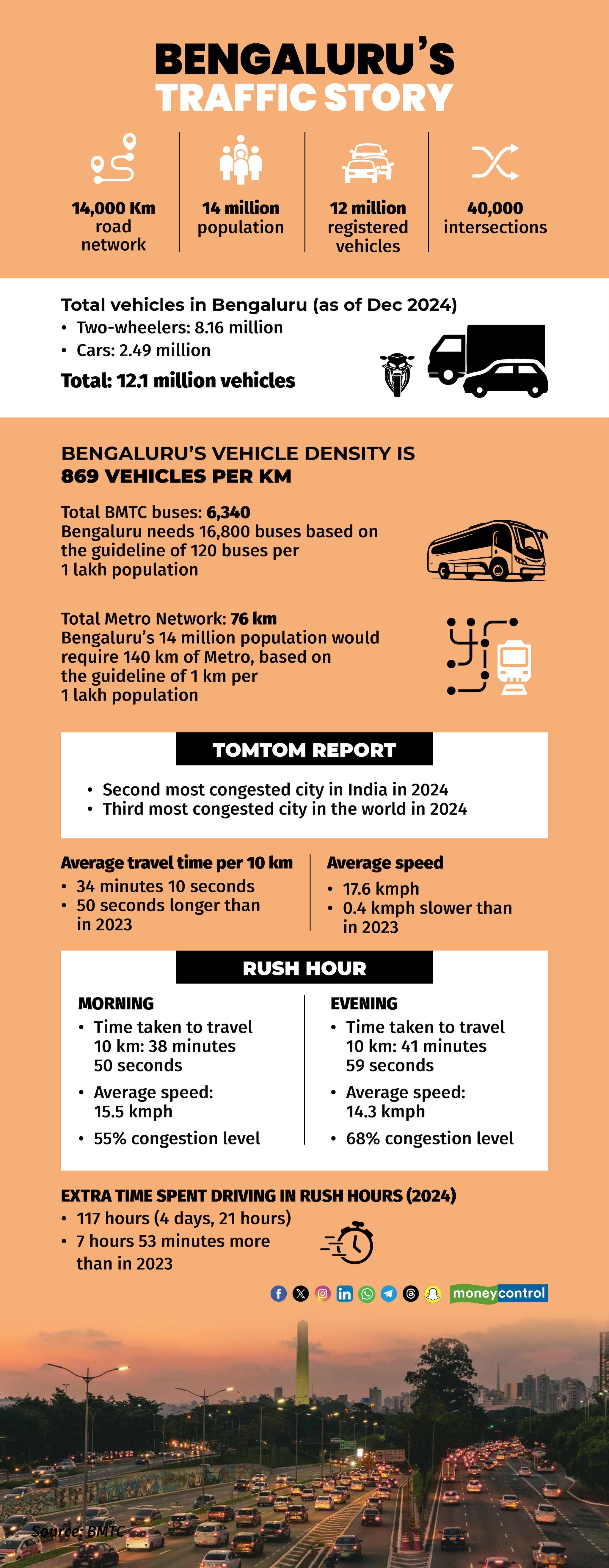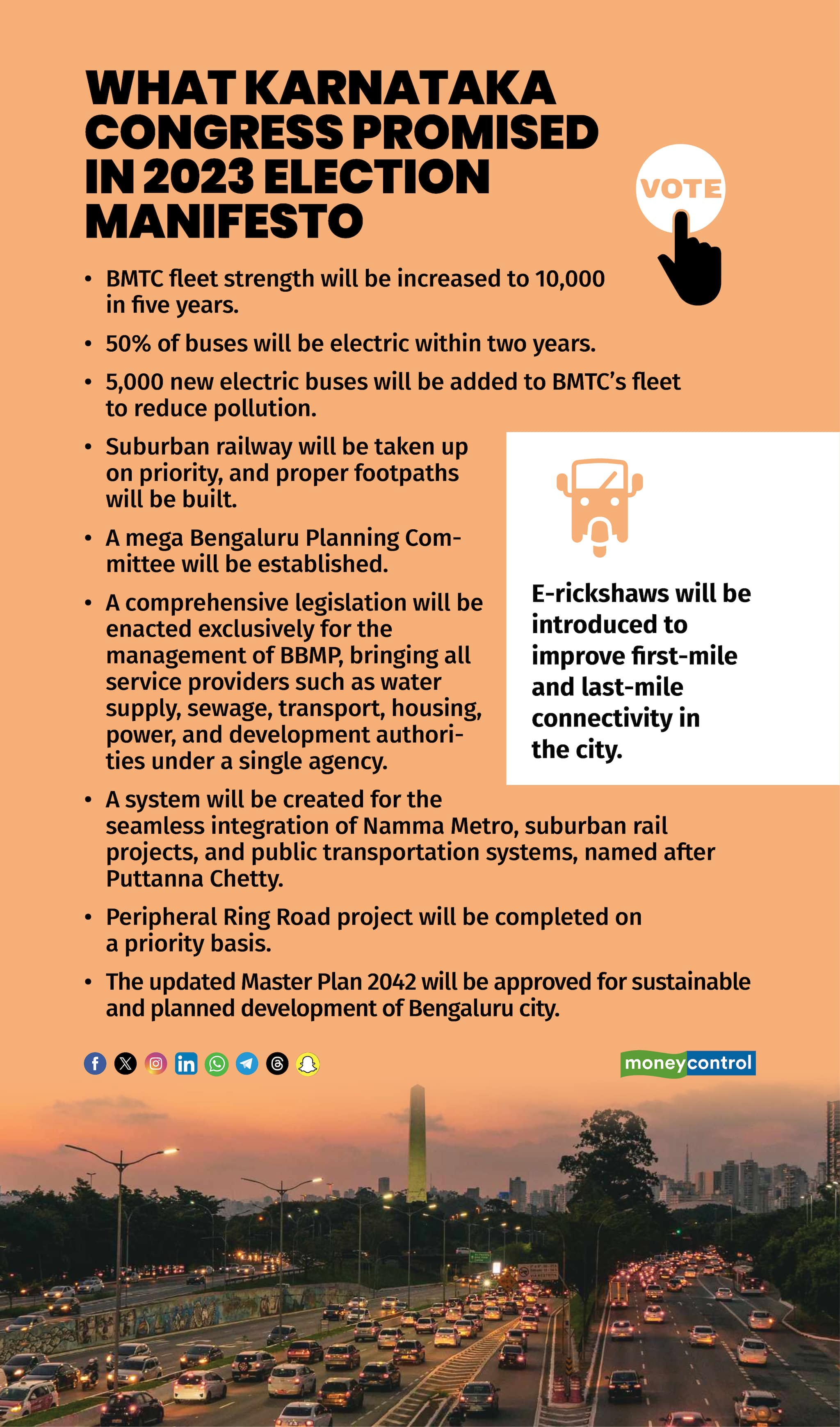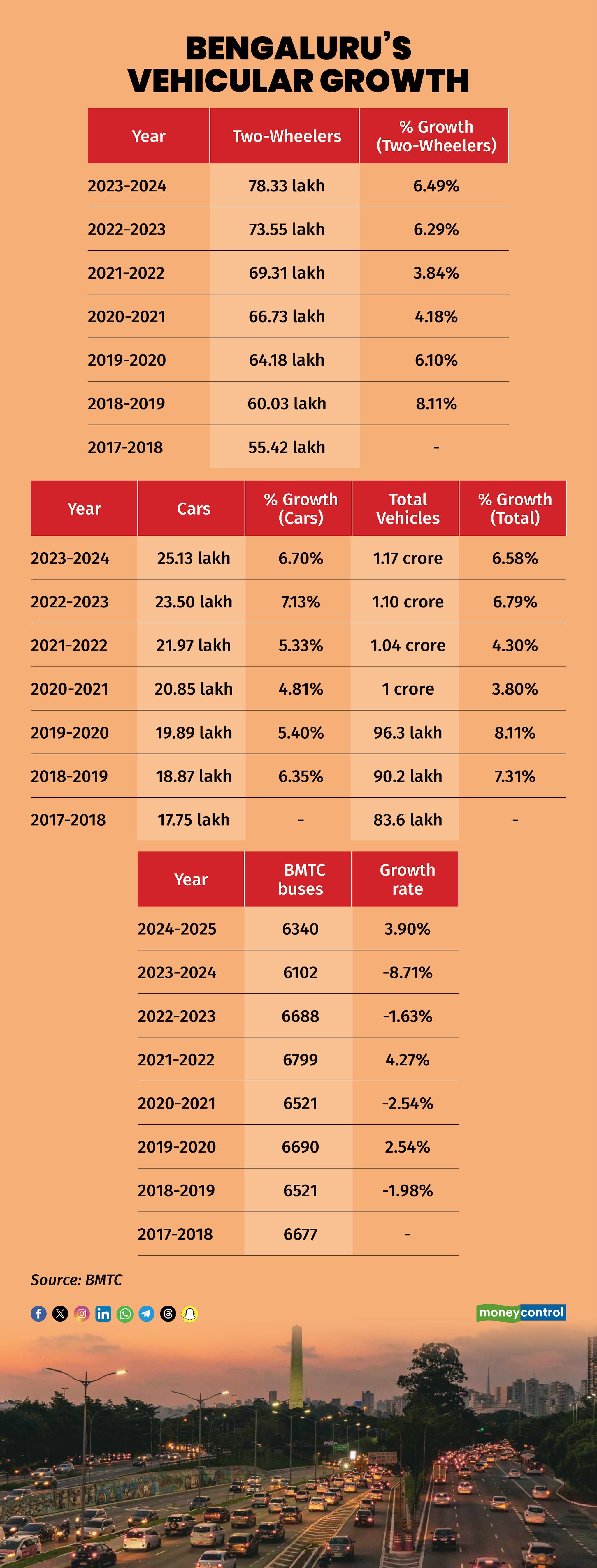



After a 15 percent increase in bus fares, Metro fares in Bengaluru are set to rise, and auto-rickshaw fares are also expected to follow suit.
The IT capital, already grappling with traffic gridlocks, is likely to see further congestion, as experts fear that the hike in fares will prompt more people will switch to private vehicles.
"The percentage of the Metro fare hike is not very clear yet, but even a 20-25 percent increase would be substantial. Similarly, BMTC has also raised its fares by a substantial 15 percent. This will likely reduce the share of public transport usage. The choice of transport mode people make in response to such substantial fare hikes will affect ridership and the public transport mode share," Ashish Verma, convenor of the Sustainable Transportation Lab at the Indian Institute of Science (IISc) told Moneycontrol.
With a population of 14 million, Bengaluru now has 1.14 crore registered vehicles, including 77.2 lakh two-wheelers and 23.6 lakh cars. Considering the city's 14,000 km road network, Bengaluru’s vehicle density is now around 869 vehicles per km, leading to gridlock situations.

"People are likely to shift to transport modes where the cost of travel for the same trip or origin-destination pair is comparatively lower. Most bus passengers will likely switch to two-wheelers if they have that option. BMTC and Metro fares have generally been higher than the cost of using a two-wheeler, and this fare hike will make it even more attractive. Even car users, who might have earlier found Metro to be a reasonable alternative, may switch back to their cars due to the fare increase," Verma said.
"Bengaluru already has one of the highest number of two-wheelers in India. One reason for this could be that two-wheelers have a better chance of cutting through traffic. Finding parking for two-wheelers is also comparatively easier. So even if people own cars, they may still prefer to use their two-wheelers for these reasons".
Also, read: Kolkata is India’s most congested city in 2024, Bengaluru ranks 2nd: TomTom report
According to the traffic index released by TomTom, a Dutch location technology specialist, Bengaluru is the second most congested city in India in 2024, after Kolkata, and the third most congested city in the world in 2024.
While Bengaluru’s traffic police and some experts question the methodologies adopted by TomTom, there is no denying the city's traffic problem. One of the main reasons for the city's broken transport system can be highlighted with these numbers: Bengaluru would need 16,800 buses based on the guideline of at least 120 buses per 1 lakh population, but it has only 6,340 buses. For Bengaluru’s population of 14 million, 140 km of Metro would be required, based on the guideline of 1 km of Metro per 1 lakh population, but it has only 76 km of operational network.
Unlike Mumbai and Chennai, Bengaluru lacks a dedicated suburban rail system. While the Union Government sanctioned a 1,480-km (four corridors) suburban rail project with a six-year deadline (2026), the Rail Infrastructure Development Company (K-RIDE), the executing agency, does not have a full-time MD. In fact, only two of the four corridors have issued civil work orders, and their deadlines have now been pushed to March 2027.
Why the Metro fare revision is untimelyWhile the Bengaluru Metro Rail Corporation Limited (BMRCL) board approved a proposal to increase Metro fares in a meeting on January 17, it is yet to announce when the fare hike will come into effect and by how much. “We will reveal the new fare structure shortly,” a senior BMRCL official said.
Also, read: After bus fare hike, Bengaluru Metro fare to increase as BMRCL board gives nod
Currently, the minimum token fare is Rs 10, and the maximum fare is Rs 60. Smart card users receive a 5 percent discount, which was reduced from 15 percent in 2020. The last fare revision was in 2017, following the completion of Phase 1 (42 km). Since then, the network has expanded to 76 km, including the Purple Line (Challaghatta–Whitefield) and the Green Line (Silk Institute–Madhavara).
Many are questioning the timing of the hike. Shashi B K, a regular Metro passenger, said, “This hike is a joke on commuters in the context of not adding a single new coach, not improving frequency. We travel like sardines, and all new lines are inordinately delayed. I urge BMRCL to hold back until Phase 2 is completed.”
“Not only the fare, but also the costs people pay due to delays—such as wasted time, higher costs of commuting with other expensive modes, and loss of productivity—are significant. Commuters are never stakeholders for BMRCL and heads must roll for delays,” he added.
Also, read: India's most congested city, Bengaluru, faces train set supply crisis

In Phase 1, for instance, BMRCL had 50 trains for 45 km. The current fleet consists of only 57 trains for 76 km. Of this, 33 deployed on the Purple Line and 24 on the Green Line. "We need to keep five trains for maintenance purposes, leaving us with 52 trains—30 on the Purple Line and 22 on the Green Line,” said a BMRCL official.
Verma said: "That's the issue with the supply of services. BMRCL is still not providing the full capacity that the Metro can serve. The capacity of the Metro can go up to around 70,000 passengers per hour- per direction. However, what BMRCL now offering, in terms of trains and frequency, is much less than that. This is one of the reasons why the trains are crowded — they aren't able to provide more frequent services or offer higher capacity." he said.
While Delhi Metro operates eight-coach trains, Bengaluru's stations and platforms are designed for six-coach trains. Officials said that Bengaluru Metro's average platform length is 135 m, which is sufficient for six-coach trains but not for longer ones since each coach is 22 m long.
To maintain a healthy frequency of three to four minutes, experts say BMRCL should have one train per Km. "In Phase 1, we had 50 trains for 45 km, but there are only 57 trains now, despite the network length including Phase 2 increasing to 76 km. This has resulted in overcrowding on Metro coaches, especially during peak hours" said an official.
Also, read: MC Explains: Overcrowded Bengaluru Metro coaches: Fallout of Indo-China conflict
When will the new coaches arrive?In December 2019, CRRC Nanjing Puzhen Co won the contract to supply 216 coaches in 173 weeks (3.5 years). Of these, 126 coaches (21 six-coach trains) are for the Purple and Green Lines, and 90 coaches (15 six-coach trains) are for the Yellow Line (RV Road–Bommasandra). The remaining 20 six-coach DTG trains will be manufactured by Kolkata-based Titagarh Rail Systems at its Uttarpara facility in West Bengal. After the delivery of all communication-based train control (CBTC) trains for the Yellow Line, the Purple and Green Lines will receive all 21 DTG trains by Q1 2027.
Cost escalationsWhile Metro man E Sreedharan says delays cost BMRCL Rs 1.5 crore daily, BMRCL attributes cost escalations to land acquisition, rising input costs, and forex fluctuations.
Phase 1 (42 km) was initially approved in 2006 at Rs 6,395 crore for 33 km. The cost rose to Rs 8,158 crore when the network was extended to 42.3 km. Further delays escalated the cost to Rs 11,609 crore in 2011, Rs 13,845 crore in 2015, and finally Rs 14,133 crore upon completion in 2017. Though approved in 2006, Bengaluru Metro's Phase 1 project faced multiple delays and took over a decade to finish.
Similarly, Phase 2 (72 km) was approved by the Union Cabinet in 2014 at Rs 26,405 crore with a five-year deadline. However, a major portion of the Phase 2 network remains under construction. Phase 2's cost escalated to Rs 30,695 crore in 2022 and further to Rs 40,614 crore in 2024, with the deadline now extended to December 2026.
Election promises in the backburnerWhile the Congress party promised several initiatives to boost public transport in its Karnataka assembly election manifesto, including increasing the BMTC fleet strength to 10,000 buses within five years and introducing e-rickshaws to improve first- and last-mile connectivity in the city, these remain on paper. In fact, it also promised the enactment of comprehensive legislation for the management of BBMP, bringing all service providers such as water supply, sewage, transport, housing, power, and development authorities under a single agency. In January 2023, then then BJP-led state government had notified the BMLTA Act after receiving the Governor's assent. However, the Bangalore Metropolitan Land Transport Authority is yet to be established.
Also, read: Six months on, London-like transport authority to ease Bengaluru’s traffic chaos remains on paper

Justifying bus fare hike, transport minister Ramalinga Reddy said the daily operational costs, including expenses on fuel and staff, have increased. “'Shakti' guarantee, which provides free rides for women on state-owned non-AC buses across the state, is continuing,” he said.
Many elected representatives have also criticised the fare hike. Bengaluru Central MP P C Mohan said: “I am disappointed by BMRCL’s decision to impose a 45 percent fare hike, ignoring my appeal to reconsider. BMRCL must urgently address key issues in its services. Overcrowding in Namma Metro has caused door malfunctions and disputes among passengers—this is unacceptable. BMRCL must prioritise adding Metro coaches, expediting delayed lines, and improving operational efficiency."
“It must also enhance security, streamline entry and exit, and improve parking, queue systems, and last-mile connectivity for a better commute. Hiking fares without fixing these issues forces people to use private vehicles, worsening congestion. BMRCL must rethink its priorities,” Mohan said.

While the number of two-wheelers in Bengaluru increased from 55.42 lakh in 2017-2018 to 78.33 lakh in 2023-2024. Similarly, the number of cars rose from 17.75 lakh in 2017-2018 to 25.13 lakh in 2023-2024. The total number of vehicles increased from 83.6 lakh in 2017-2018 to 1.17 crore in 2023-2024. However, the number of BMTC buses decreased from 6,677 in 2017-2018 to 6,340 in 2024-2025.
Verma said: "All these issues arise when we don’t have a clear vision for the city in terms of a sustainable system and what will make the city a more liveable place. When there is no clarity on these matters, on one hand, we are simply adding more road capacity and constructing tunnels, which only make personal vehicles more attractive to use. On the other hand, we are increasing the fare of public transport services without rapidly expanding their supply and networks. This makes public transport less and less attractive while making personal vehicles more and more appealing. It’s a reverse push-and-pull. What we should actually be doing is the opposite: making public transport more attractive and making the use of personal vehicles less appealing."
Also, read: 'Brand Bengaluru' caught between DK Shivakumar’s vanity projects and city's crumbling infra
Discover the latest Business News, Sensex, and Nifty updates. Obtain Personal Finance insights, tax queries, and expert opinions on Moneycontrol or download the Moneycontrol App to stay updated!
Find the best of Al News in one place, specially curated for you every weekend.
Stay on top of the latest tech trends and biggest startup news.